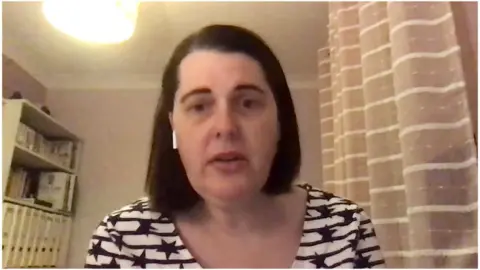Long Covid: Sufferers 'need initial diagnosis'
 BBC
BBCA nurse suffering from long Covid three months after being struck down with the virus has stressed the importance of diagnosis to get the right treatment.
Leanne Lewis was working at the Royal Glamorgan Hospital in October when she developed symptoms so quickly she "felt like I'd been hit by a bus".
It now takes her a long time to carry out basic tasks, is breathless and is being investigated for heart problems.
She has been unable to return to work and has felt "very isolated".
Ms Lewis, from Pencoed near Bridgend, said she did not have classic symptoms: "It just came on so quick.
"In the morning I was fine, out and about with my son, and then all of a sudden I just literally felt as if I'd been knocked down by a bus."
She had such a severe headache it gave her double vision.
"Initially there was not a joint in my body that didn't feel pain. Probably the first four to five days I literally couldn't get out of bed. I was extremely short of breath and getting a lot of lung pain.
"I automatically thought that 10 to 14 days on I would be back to normal, but sadly that hasn't been the case."
She described ongoing breathlessness and said her oxygen saturation levels have continued to drop, while her heart rate "will go from one extreme to another".
"Yesterday, for example, it was 28 beats per minute (bpm) and then as quickly as it goes down it will shoot up to 140, 150 bpm.
"I've had a hospital admission where they were questioning whether I had multiple clots on the lung. I was tested for heart failure.
"Thankfully it's not showing signs of failure but I've been told I'm going for a scan to check the damage caused by coronavirus."
The illness has left her unable to work or take part in ordinary family life.
She said: "We're unable to do the things we used to do but if we weren't in lockdown we're usually very active. I enjoy going out with the dog and doing day-to-day things with the family.
"I can't get up straight away. I've got to spend at least half an hour thinking about getting out of bed. I get dressed in stages because I get so breathless.
"Just doing the slightest things I used to take for granted every day is nigh-on impossible now."
'Rehab is important, but so is diagnosis'
She found support through the Long Covid Wales group which made her realise how many people have been similarly affected.
"There are people from all walks of life but I'm surprised how many people work for the NHS are actually experiencing similar symptoms to myself," she said.
The UK government has promised 40 long Covid clinics for England whereas the Welsh government said it expected health boards to develop and improve access to rehabilitation services.
Ms Lewis thinks the specialist type of facility will be crucial in helping people get the right treatment: "Rehab is important but I think the important thing is the initial diagnosis.
"For me, for example, where I'm having problems with my heart, I'd be very anxious to undertake any rehab, exercise for example, because I don't know whether I'm causing further damage to my heart."
She thinks clinics need a "holistic assessment" at the beginning with a variety of professionals available to investigate symptoms.
At the moment she said individuals were being referred to several services.
"If you had that clinic you could have an initial assessment and then signpost you appropriately and make that referral.
"We all know the pressures the NHS is under and the delays due to the pandemic, and if that was the basis behind the idea for the clinics that would reduce the amount of unnecessary referrals as well."
